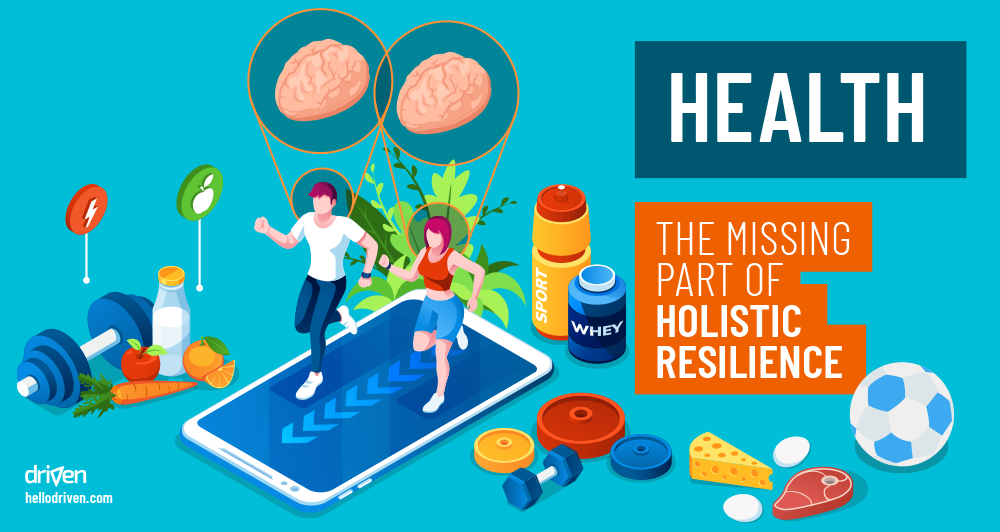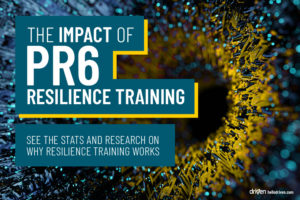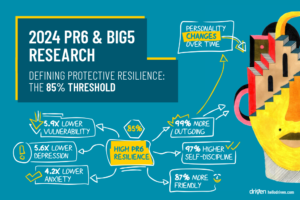When we began our study into the science of resilience, our initial search for a resilience measurement system revealed something curious – none of the major resilience measures incorporated physical health. Turns out that for decades now, psychological resilience has mainly been studied as a mental concept – an abstract property living in somewhere in the brain and somehow immune to the state of the body.
This is an interesting and crucial opportunity for research, especially since more and more recent studies show that resilience affects your health, and your health affects your resilience. Unravelling the relationship between the two is likely to become a cornerstone of resilience research and one of the keys to mental wellbeing in the coming decades.
Mind your body
Your own thoughts have a direct effect on your body. For example, stress and fear are produced as a response to your environment when your brain determines that the situation presents a threat.
For example, let’s say your manager walks past and says to you: “We need to talk. Come by my office in five minutes.”
Immediately you might start worrying about what you might have done wrong. Are you going to get a warning for something? Or fired? Maybe that Czech goulash recipe you emailed yourself from work broke company policy…
As you fret about the impending meeting, your hypothalamic–pituitary–adrenal (HPA) axis activates due to the threat perceived by your brain. When the HPA activates, cortisol is released into your bloodstream. While some cortisol is necessary, too much cortisol lowers immune function, increases weight gain, raises the risk of depression, and lowers your life expectancy. Along with mental effects, there are definite negative effects to your physical health, caused by how you react to the various everyday events in your life.
Meanwhile five minutes passed and you head into your manager’s office. Your adrenaline pumping, he sits you down and tells you that he tried the goulash you went on about and it changed his life. In fact, he wants you to send over more recipes if you have any. Non-existent crisis averted.
Research by Tugade and Fredrickson in 2004 showed that psychological resilience has mechanisms to help prevent this kind of stress activation. For example, expanding our emotional granularity – so we can accurately identify what we are feeling in the moment – is proven to help calm an emotional response. Granularity here does not mean the ability to rattle off a lot of different emotions, but instead to pick one specific emotion that most accurately identifies what you are feeling – such as identifying a feeling of stress as actually one of frustration. The act of labelling distances you from the emotion and presents you with a choice – give in to feeling the emotion, or divert your mind if the emotion is not helpful for the current situation.
As a more proactive mechanism, having constructive beliefs about the people and world around you allows you to adjust your initial reactions to events. In our previous example, a constructive mindset would not see a manager asking to talk as something negative, but neutral in itself until the purpose is revealed. Through resilience, a constructive mindset prevents frequent stress responses and negative effects to your own health.
Having constructive beliefs about the people and world around you allows you to adjust your initial reactions to events.
Adapt or… Don’t
Reducing physical stress through psychological resilience is one part, so how does health affect your mind? For one, there’s the proven effect of chronic health issues impacting mood (Eckenrode, 1984, McWilliams, 2003). If you have chronic pain that you deal with every day, naturally that will affect your mindset with which you approach life.
There’s also the effect of a neurochemical called brain-derived neurotrophic factor, or BDNF, for short. BDNF plays a very important role in the brain, namely helping to keep neurons alive and also encouraging new neural growth. This is critically important for memory, learning, and adaptation. Essentially, BDNF is the enabler of neuroplasticity.
Comparing this concept to the definition of resilience as ‘advancing despite adversity’, what we need to advance is for the brain to adapt. This means that BDNF, as the enabler of neural adaptation, is crucial for long-term resilience. The brain needs this to help you adapt to changing circumstances in your life and help you learn new skills along the way. Without BDNF, our thinking becomes rigid and gets stuck in old ways of thinking.
So where does this neurochemical come from? Surprisingly, BDNF is not something we can think into existence – instead it comes through three main factors of physical health. These factors are regular exercise, quality sleep, and good nutrition.
Regular exercise has proven to be a reliable way of increasing BDNF, even at old age (Cotman, 2002). It has the ability to improve memory (Cassilhas, 2012) and protect against neurodegenerative disorders in the long-term (Colcombe, 2006). Eating lots of food high in sugars and trans fats reduces BDNF (Molteni, 2002). If stress affects your sleep and you don’t get quality rest, then BDNF levels are also reduced (Giese, 2013). All three factors need to be maintained to maximise BDNF.
What’s interesting here is that these health hygiene factors are not just about maintaining your body, but about maintaining your mind. These show how resilience is impacted by your health, and also how your health hygiene affects your resilience and ability to adapt.
We have to remember that we need a resilient mindset to be able to stick to a healthy lifestyle in the first place. It’s all good and well if exercise and good nutrition has positive effects, but we need to stick to it through life’s ups and downs if we want to get the benefits. Maintaining good health requires resilience – there is no way around it. In turn, the positive effects from these healthy habits contribute to long-term mental functioning and vitality.
Maintaining good health requires resilience – there is no way around it.
Holistic resilience
The accumulating research on this bi-directional relationship between health and resilience is what drove us to include health as a key resilience domain in our research. Through further analysis, we’ve shown that indeed there is a correlation between health and traditional psychological resilience, and that it is an area that should be further studied.
Our measurement tool, the Predictive 6 Factor Resilience Scale (PR6), includes health as a domain and is already being used successfully by many clinicians and organisations to help people understand their resilience from a holistic perspective. To make it as useful as possible, we have different modes available:
Businesses – If you want to understand and build the resilience of your employees, the PR6 is available for easy deployment through our scalable platform
Clinicians & Coaches – If you need to measure and track progress of psychological assistance, the PR6 is available for individual use to psychologists and clinicians here
Certification – If you’re interested in becoming a certified resilience coach, check out our training course
All the best,
Jurie
References:
Tugade, M. M., Fredrickson, B. L., & Feldman Barrett, L. (2004). Psychological resilience and positive emotional granularity: Examining the benefits of positive emotions on coping and health. Journal of personality, 72(6), 11611190.
Eckenrode, J. (1984). Impact of chronic and acute stressors on daily reports of mood. Journal of personality and social psychology, 46(4), 907. 49.
McWilliams, L. A., Cox, B. J., & Enns, M. W. (2003). Mood and anxiety disorders associated with chronic pain: an examination in a nationally representative sample. Pain, 106(1), 127-133. 50
Cotman, C. W., & Berchtold, N. C. (2002). Exercise: a behavioral intervention to enhance brain health and plasticity. Trends in neurosciences, 25(6), 295-301.
Cassilhas, R. C., Lee, K. S., Fernandes, J., Oliveira, M. G. M., Tufik, S., Meeusen, R., & De Mello, M. T. (2012). Spatial memory is improved by aerobic and resistance exercise through divergent molecular mechanisms. Neuroscience, 202, 309-317.
Colcombe, S. J., Erickson, K. I., Scalf, P. E., Kim, J. S., Prakash, R., McAuley, E., … & Kramer, A. F. (2006). Aerobic exercise training increases brain volume in aging humans. The Journals of Gerontology Series A: Biological Sciences and Medical Sciences, 61(11), 1166-1170.
Molteni, R., Barnard, R. J., Ying, Z., Roberts, C. K., & Gomez-Pinilla, F. (2002). A high-fat, refined sugar diet reduces hippocampal brain-derived neurotrophic factor, neuronal plasticity, and learning. Neuroscience, 112(4), 803-814.
Giese, M., Unternaehrer, E., Brand, S., Calabrese, P., Holsboer-Trachsler, E., & Eckert, A. (2013). The interplay of



